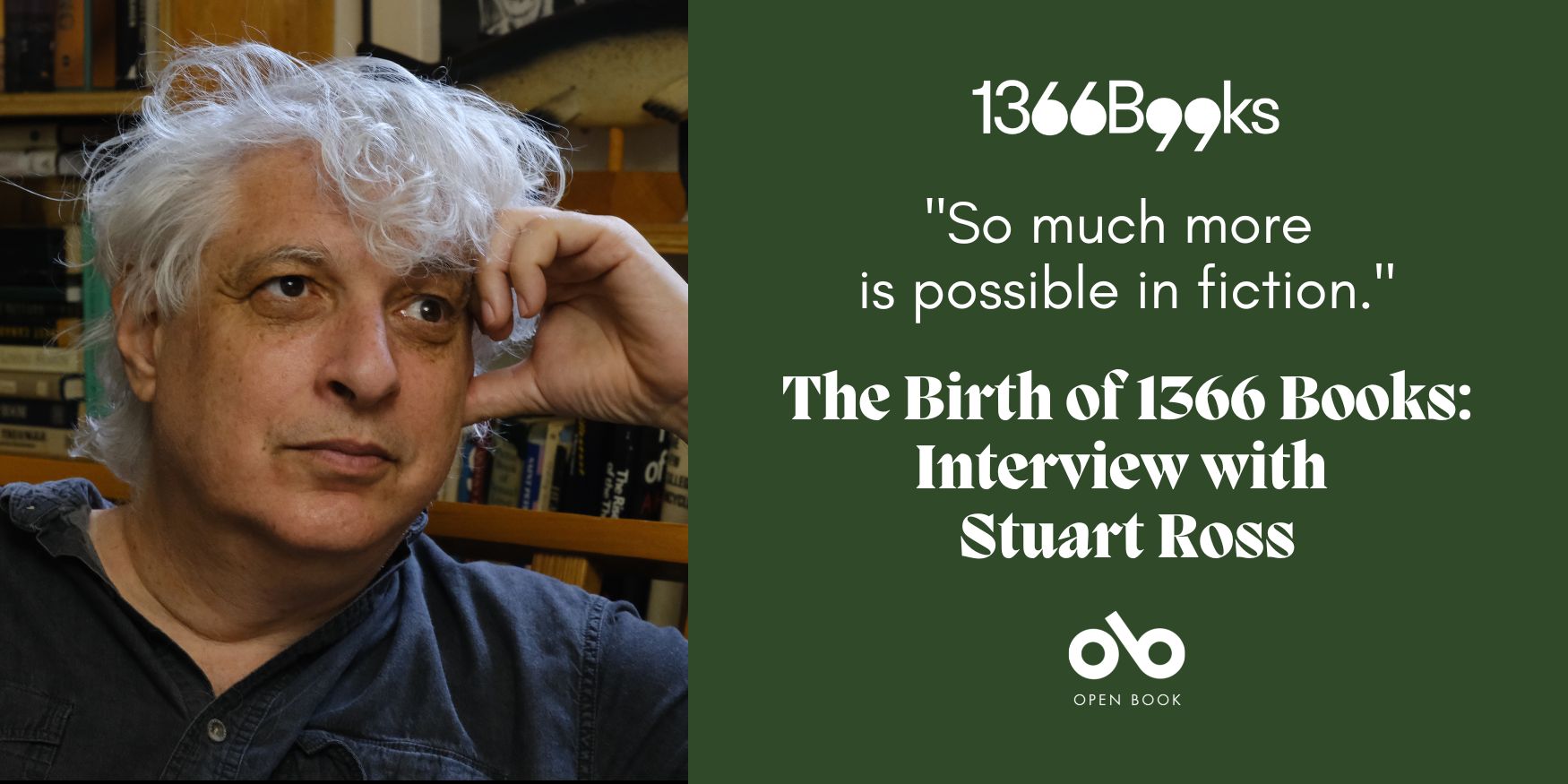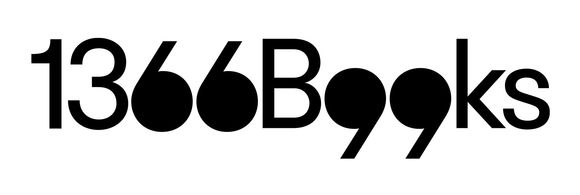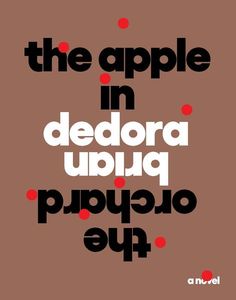Stuart Ross Creates a Place for a Weirder, Wilder, More Innovative CanLit with 1366 Books
The rules for what a novel or short story can—or must—be have been in flux since the forms first began. And yet, truly out-of-the-box fiction and successful formal experimentation is hard to find. When creative boundary-pushing works though, it often becomes some of the most beloved and studied writing around, from Joyce and Calvino to Jeanette Winterson and Eimear McBride.
Stuart Ross, a poet and fiction writer known for playing with literary conventions in his own acclaimed work, wants to find and celebrate Canada's most creative literary innovators. In order to do so, he recently launched 1366 Books, an imprint of Guernica Editions. Calling itself a home for "works of accessible yet innovative and experimental fiction", 1366 Books is looking to stretch and expand what we think of as fiction—to get delightfully, and unapologetically, weird. The imprint is open to submissions and particularly welcomes writing from historically underrepresented and equity-seeking groups.
The first two 1366 books have just been announced, with BC author Brian Dedora's The Apple in the Orchard and Sarah Moses’s fiction debut Strange Water forthcoming. The covers, designed by Toronto's Underline Studio, reflect the line's identity.
We spoke to Ross about 1366's inception, what literary innovation means to him (and why it's so exciting), and where he sees 1366 Books going in the future. He joked about a strategy to "lure readers in gently and then clobber them with experimental", ruminated on why CanLit seems to have been more experimental in its fiction in the past, and detailed the off the cuff social media post that unexpectedly started the 1366 ball rolling.
Open Book:
This imprint is about embracing innovation and exploring boundaries in fiction. What does innovation in fiction, specifically, mean to you?
Stuart Ross:
Simply put, for me, innovation in fiction means challenging conventions, expanding boundaries, and confounding expectations. Oh, and maybe a bit of literary sabotage. I struggled with what term to use to describe my imprint: innovative, experimental, anti-fiction, plotless, page-bending? A 1366 Book will embrace some combination of those. “Innovative” sounds more friendly, though: so we can lure readers in gently and then clobber them with experimental or anti-. And when I say “plotless,” I am including texts that may have a different or radical way of approaching “plot.” Can imagery, syntax, typography be plot? I guess we’ll find out.
OB:
Part of the raison d’être for the new imprint was your observation that fiction writers don’t necessarily feel empowered or drawn to experimentation as some other genres like poetry and playwriting. Why do you think that has been?
SR:
It bewilders me, honestly. Here in Canada, there was a lot more experimentation with fiction in the 1960s and 1970s, and most of it evaporated. Prize culture? MFA programs? Grants? Careerism? I don’t get it. Is it because fiction = story = narrative? Narrative = sales = a career? In 2021 I was writer-in-residence for the University of Ottawa’s English department and was invited to create a fourth-year creative writing workshop to teach. I designed a course in experimental fiction. I didn’t realize that it was the only fourth-year creative writing workshop in the program, and I was thrilled when a dozen students registered for it. Turns out, none of them had a particular interest in experimental fiction—they wanted to write conventional novels, science fiction and fantasy, graphic novels. But they were great sports, and once they were introduced to some of the stranger possibilities of the page, they dove right in and produced a lot of amazing work. So perhaps it’s just a matter of getting past that linear, conventional brainwash conspiracy and learning that so much more is possible in fiction.
OB:
This collaboration originally came about from a somewhat cheeky social media post you made [editor's note: Ross's post read "Any millionaires out there feel like starting up a press devoted exclusively to book-length Canadian experimental fiction, I'm your acquiring editor.”], with Guernica Publisher Michael Mirolla replying with the idea of an imprint. What was the road like from tweet to reality? Were you shocked to have this come to fruition in this way?
SR:
Really, if a millionaire had stepped forward, I would have had a full-time job and never been able to do any more of my own writing. So this imprint was the perfect solution, and I’m grateful to Michael and his team at Guernica for putting their trust in me and taking this risk. Practically speaking, we exchanged emails for a month or two and then decided the fit was a good one. I am very motivated: I don’t want to let them down, and I don’t want to let the 1366 authors down! (I have found, by the way, that casual comments or social media posts have resulted, for me, in all sorts of unexpected collaborations and opportunities.)
Your CanLit News
Subscribe to Open Book’s newsletter to get local book events, literary content, writing tips, and more in your inbox
OB:
You’ve been celebrated for the creativity and innovation in your fiction. Are there are other fiction writers or books you’ve loved that you feel are doing exciting things with the form?
SR:
Going back in time, I really admire the experimental fiction of the 1960s and 1970s that B. S. Johnson, Toby McLennan, Donald Barthelme, bpNichol, and Daphne Marlatt were creating, among others. Hell, I still consider Michael Ondaatje’s greatest novel, Coming Through Slaughter, a masterpiece of innovation! In the past few decades, there have been ground-breaking, disturbing, and exhilarating works by Theresa Hak Kyung Cha, Renee Gladman, Vi Khi Nao, and Raymond Federman. And I’d be remiss to leave out Samuel Beckett, my own greatest literary inspiration.
OB:
What do you see for the future of the imprint? What would you love to see come about with it in the next few years?
SR:
I want to be surprised by the imprint’s future. I don’t want to plan or prescribe: I’m hoping that I’ll receive manuscripts that do with fiction things I had never imagined. Of course, I also want each of the books to win GGs and Pulitzers and Cracker Jack prizes, plus the occasional Nobel, and to change the course of Canadian fiction and overthrow the capitalist patriarchy. But beyond these modest dreams, I’m open to wherever the imprint leads me. I’m excited by the first two titles, coming out in 2024: experimental lit vet Brian Dedora’s novel The Apple in the Orchard is a rich and disorienting exploration of abuse trauma, class, and much more, and translator Sarah Moses’s fiction debut, the story collection Strange Water, features tiny, dreamlike fictions that turn normal on its noggin and take place in constant movement. I’m excited about—in year one of the imprint—showcasing exciting works by a writer with a five-decade literary history and by a newcomer. We’ll see where the imprint goes after that one-two punch to the, uh, solar flexus.
___________________________________________
Stuart Ross is the author of 20 books of fiction, poetry, and essays. He received the 2019 Harbourfront Festival Prize, the 2017 Canadian Jewish Literary Award for Poetry, and the 2010 ReLit Award for Short Fiction. His work has been translated into Nynorsk, French, Spanish, Estonian, Slovenian, and Russian. Stuart lives in Cobourg, Ontario.





